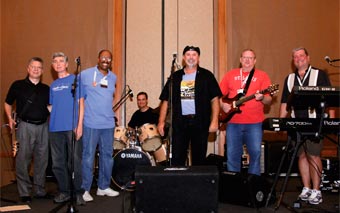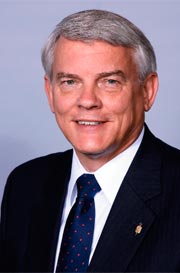|
Doug is in and undaunted
Holtz assumes leadership of the CPCU Society
By Bruce D. Hicks, CPCU, CLU
The location of Denver—the Mile High City—where the CPCU Society’s annual convention was held in September, serves as an apt metaphor for the ascension of Doug Holtz to the presidency of the Society. When a person is that far up, the view is amazing, but seeing so much has the potential to be intimidating. Holtz, a commercial underwriting consultant with Liberty Mutual Agency Markets, is the latest insurance veteran to climb to the Chartered Property and Casualty Underwriting Society’s leadership peak. From all appearances, he’s quite pleased with the view.
Doug’s annual meeting schedule was similar to those of his predecessors. In other words, it was insanely busy, filled with board meetings, committee meetings, seminars, receptions, speeches and networking. However, he was gracious in finding time to talk about his new presidency.
Rough Notes: Doug, at what point did you realize that you were interested in becoming the CPCU Society president?
Holtz: I think that it happened around the time that I became a Society governor. Once I started participation on the board, I developed a desire to continue to serve and to help build up the Society. I believe in our vision and in our foundations and commitment to practicing ethics, promoting professionalism and supporting continuing education. These spurred me to seek a way to continue in a leadership role.
Rough Notes: What Society post, prior to becoming president-elect, did you find to be the most interesting or challenging?
Holtz: I’ve found all Society levels to be very challenging, as you need to expand your perspective in order to grow into the various roles. As you work your way up, you realize that you can fulfill the responsibilities of each position. One aspect of my duties that I’ve found most gratifying is visiting our chapters.
They come in all sizes and they have different needs. It’s been my experience that some can use assistance and direction while others are very self-sufficient but are receptive to ideas from Society leadership. I’m amazed at the dedication and desire of chapter members to recruit, mentor and assist others. Our chapters are a huge network consisting of assistance, camaraderie, professionalism and mentorship.
Editor’s Note: The next question revolves around the Society’s decision to reorganize its governing board over a three-year period. That change is still being implemented as a result of a recommendation made by a task force headed by Holtz. Prior to the change, the Society’s Board of Directors consisted of its Board of Governors, and exceeded 40 members. (A Society governor’s board duties were combined with his or her responsibilities of providing guidance and liaision for a given number of chapters.) When the transition is complete, the board will number 18, consisting of Directors, a newly created position. The Governor positions will focus on their chapter oversight/liaison duties and will no longer have board responsibilities.
Rough Notes: What inspired you to be the driving force in the Society’s decision to reorganize its governing board?
Holtz: Actually I was asked by former Society President Jim Britt to take the lead on a task force on the issue. When he did ask, I thought our governance structure needed change. I accepted Britt’s offer to review our governance. I realized that to be more effective, we needed to reduce the number of directors and better define our director and governor roles.
I was pleased and impressed with the dedication and commitment that the task force members applied to implementing their charge to come up with a play to address our governance need.
Rough Notes: How would you assess the transition?
Holtz: We’re still working through many details. I believe that high-level decisions were right. Our board members are recognizing the need to work out details of making the change. They also recognize the long-term benefits of the change. It is proving out that the three-year transition period was the proper length necessary to get the plan implemented.
Rough Notes: As a member and former president of the Society’s Central Indiana Chapter, how do you feel about the selection of Indianapolis as the site of its 2015 meeting?
Holtz: I’m very excited about the choice. Indiana is often considered a “flyover” state. Yet many people don’t realize how much the city and the state have to offer. The Central Indiana Chapter is very excited about the opportunity to be the host chapter for the annual meeting. They are eager and fully prepared to handle it. I sincerely feel that all visitors will be very pleased with Indianapolis as a host city for an annual meeting!
Rough Notes: What is it that you most hope to accomplish during your term?
Holtz: There are six areas of focus for my term. The agenda—my agenda—is to continue the work of Britt, (Marvin) Kelly, myself and those presidents who follow us. Essentially, I want to:
• Develop our Directorship level so that it will promote a climate of direction, focus and achievement.
• Enhance how our Governors and programs support chapter efforts, particularly in attracting new members and retaining current ones.
• Accelerate our focused support for identifying recruiting and developing future Society leaders.
• Increase the value of Society membership at all organization levels.
• Work to support the Shared Vision the Society created with the American Institute for Chartered Property Casualty Underwriters that is intended to maximize exposure to the designation.
• Promote increased global awareness of the value of membership in the CPCU Society.
Rough Notes: How do you think the Society is positioned for future growth?
Holtz: Right now we’re at a crossroads. Our member base is subject to changing demographics, the economy, and competition with other credentialed and educational programs. Potential members are challenged with pressures on time and their willingness to give the time needed to pursue a CPCU. We are still challenged to make CPCU a designation of choice and to bring value to members and insurance industry personnel.
Rough Notes: This year brings more than a thousand new CPCUs into the organization. What is your message to this group?
Holtz: We and the organization want to tell them that the designation does not end their goal of continuing education. Association membership provides continuing education as well as networking and leadership opportunities.
I believe in the words that have been passed down to us by a former Society president: The CPCU (designation) is not a destination, but a journey and there are ongoing benefits and rewards for becoming a CPCU.
The author
Senior Editor for Technical and Educational Products at The Rough Notes Company, Bruce D. Hicks, CPCU, CLU, has more than 25 years of property/casualty insurance experience. Bruce is active in the Central Indiana Chapter of the CPCU Society, has served on the Society’s Information Technology and Diversity Committees and is currently a member of the CPCU Society’s Board of Governors.
CPCUs ... Rockin’ out in the Rockies
 |
| Members of the CPCU Society band “Unchartered” gather before one of their performances at the Society’s annual meeting in Denver. Left to right are Mark Dolinski, John Kelly, Bruce Hicks, Steve Brown (seated behind drums), Tony Nix, Ed Breight and Jeff Lance. |
I’ve been coming to the CPCU annual meetings for nearly a decade. I’ve been involved with seminars, committees, task forces, editor meetings, governing boards and presentations, but I never thought I would be where I found myself at the 2009 CPCU annual meeting—on a stage, before hundreds of newly minted CPCUs, fronting a rock ‘n roll band made up of CPCUs and belting out “Soul Man.”
Composed of CPCUs and CPCU Society staff, our group took on the name “Unchartered.” And we were. We came from Missouri, Pennsylvania, Indiana, and Oklahoma. A guitarist, two bassists, a keyboardist and, not one, not two, but three drummers. This hardy group found time amidst many meetings, classes and commitments to move hundreds of pounds of equipment between two different sites in order to perform a set of rock music at three different receptions. Two were at the Downtown Denver Sheraton and the other at the Denver Convention Center.
It took a long time. It took a lot of planning, though the beginning was simple. During the ’97 annual meeting in Dallas, a group of CPCU musicians had an impromptu jam session during that meeting’s final night celebration. Over the years, the tale was told and it inspired other musicians with the designation to think of performing at another meeting.
A few CPCUs talked about the idea in earnest during the ’08 Philadelphia meeting. Coincidentally, at two different times and locations, several members, one being myself, caught the ear of the incoming president, Marvin Kelly, who liked the idea. It wasn’t known at that time that President Kelly would sit in with the band at two events of the ’09 meeting, singing a verse of Bill Withers’ “Ain’t No Sunshine When She’s Gone.”
I started discussing plans with Society staff members, primarily John Kelly, the Society’s director of Program Content, and Sue Wagner, the Society’s meeting director. With their help, along with assistance from the host CPCU Chapter in Denver, I was able to reach out to find other musicians and put together the logistics necessary to make the band a reality.
Over the following weeks and months, a group of musicians formed and began the various tasks needed to possibly perform at the annual meeting in Denver. Working via phone, e-mail and the Internet, the group discussed songs, membership, instruments and, most important, the logistics needed to get the job done. This included arranging for instrument and equipment rental, finding a truck to transport the same between the hotel and the convention center, developing a song list, setting up PA equipment, arranging practices and deciding upon singing and instrument rotations.
After all the time and effort of a small and dedicated group of CPCUs, “Unchartered” was born! Its objectives were to demonstrate the talent and diversity found among the membership of the CPCU Society. Says Mark Dolinsky: “It was a great to have an opportunity to play with such a talented group.” Tony Nix, CPCU, who did much of the singing and who played drums while I sang “Soul Man,” states: “It never ceases to amaze me what impact being a CPCU has had in my professional life.” And guitarist Ed Breight, CPCU, adds, “CPCUs are the sort of people who are used to making commitments, setting goals, and getting things done!”
Ed also sums up the feelings of the entire group: “We owe a huge debt of gratitude to Marvin and the rest of the Society leadership for giving us their support. Without them, this would have been no more than a pipe dream.” And John adds, “I will carry the memories of the music and the camaraderie throughout my lifetime.”
Our brains were scrambled, backs were sore and nerves were frazzled but, oh, it had never been so much fun to be a CPCU while “Rockin’ the West.”
—Bruce D. Hicks, CPCU, CLU |
|
|
| |
 |
| |
“I believe in our vision and in our foundations and commitment to practicing ethics, promoting professionalism and supporting continuing education.”
—Douglas J. Holtz, CPCU,
CIC, CSP, CRM
2009-2010 CPCU Society President/Chairman
|
|